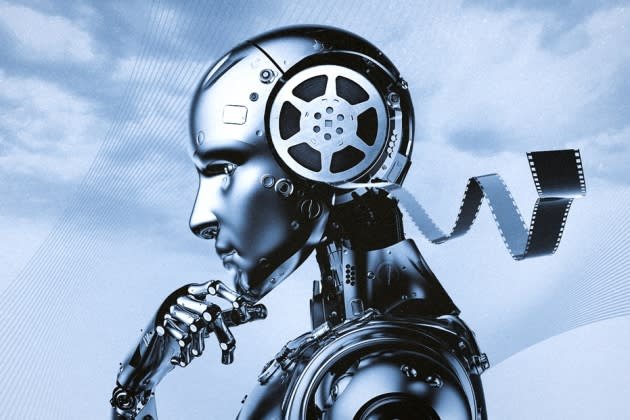
Hollywood’s collaboration with AI companies has sparked discussions on the intersection of entertainment and technology in California. As the entertainment industry continues to evolve, AI is playing a significant role in shaping the future of entertainment. From movie production to audience engagement, AI technologies are revolutionizing the way we create and consume content.
One area where AI is making a significant impact is in movie production. AI algorithms are being used to analyze scripts and predict box office success, helping studios make informed decisions about which projects to pursue. By analyzing data from previous successful films, AI can identify patterns and trends that can guide filmmakers in creating content that resonates with audiences. This not only helps studios minimize financial risks but also enhances the chances of producing commercially successful movies.
Furthermore, AI is also being used in the post-production process to enhance visual effects and streamline editing. AI-powered software can analyze footage and automatically identify the best shots, saving time and effort for editors. Additionally, AI algorithms can generate realistic CGI effects, reducing the need for manual labor and making the production process more efficient.
AI is not only transforming the production side of the entertainment industry but also revolutionizing audience engagement. AI-powered chatbots and virtual assistants are being employed to interact with viewers, providing personalized recommendations and answering questions about movies and TV shows. These chatbots can analyze individual preferences and viewing habits to suggest content that aligns with the viewer’s interests, creating a more tailored and immersive entertainment experience.
Moreover, AI is also being utilized in the distribution and marketing of films. AI algorithms can analyze social media trends and public sentiment to determine the most effective marketing strategies. By understanding audience preferences and behavior, studios can target their marketing efforts more precisely, maximizing the reach and impact of their promotional campaigns.
In conclusion, the collaboration between Hollywood and AI companies is transforming the entertainment industry in numerous ways. From improving movie production processes to enhancing audience engagement and optimizing marketing strategies, AI is revolutionizing the way we create, consume, and experience entertainment. As technology continues to advance, we can expect even more exciting developments and innovations in the entertainment industry.
Moreover, AI is revolutionizing the way movies are marketed and distributed. With the help of AI, studios can target specific audiences more effectively by analyzing demographic data, social media trends, and viewing habits. This allows for personalized advertising campaigns that are tailored to individual viewers, increasing the chances of a movie’s success at the box office.
In addition to marketing, AI is also transforming the movie-watching experience itself. Streaming platforms like Netflix and Amazon Prime are using AI algorithms to recommend movies and TV shows to their users based on their viewing history and preferences. This not only helps viewers discover new content but also keeps them engaged and subscribed to the platform.
Furthermore, AI is being used to improve the accessibility of movies for people with disabilities. For instance, AI-powered captioning and audio description technologies can automatically generate subtitles and audio descriptions for visually and hearing-impaired individuals. This ensures that everyone can enjoy movies and have equal access to entertainment.
However, while the impact of AI on movie production is mostly positive, there are also concerns about the potential loss of jobs in the industry. As AI takes over tasks that were previously done by humans, such as editing and visual effects, there is a fear that many professionals in the film industry may become obsolete. It is crucial for filmmakers and industry professionals to adapt to these changes and acquire new skills that are relevant in the age of AI.
In conclusion, AI is revolutionizing the movie production process in various ways. From helping filmmakers make informed decisions to enhancing visual effects and streamlining editing processes, AI is making movies more efficient, cost-effective, and visually stunning. Additionally, AI is transforming the way movies are marketed, distributed, and watched, providing personalized experiences for viewers. However, it is important to address the potential job displacement caused by AI and ensure that the film industry adapts to these changes in a way that benefits both the industry and its professionals.
AI and Audience Engagement
AI is revolutionizing audience engagement in the entertainment industry. Streaming platforms like Netflix and Amazon Prime are using AI algorithms to recommend personalized content to their users. By analyzing user data and preferences, AI can suggest movies and TV shows that are likely to be of interest to each individual viewer. This not only improves the user experience but also helps content creators reach their target audience more effectively.
AI is also being used to create interactive experiences for audiences. Virtual reality (VR) and augmented reality (AR) technologies are being combined with AI to create immersive and interactive storytelling experiences. Viewers can now step into the world of their favorite movies and interact with the characters and settings in ways that were previously unimaginable.
In addition to personalized recommendations and interactive experiences, AI is also transforming the way content is created and delivered. AI-powered tools are being used to analyze audience feedback and sentiment, helping content creators understand what resonates with their viewers. This data-driven approach allows for more targeted storytelling and enables content creators to make informed decisions about the direction of their projects.
Furthermore, AI is enhancing the production process itself. Machine learning algorithms can analyze large amounts of data, such as historical box office performance and audience demographics, to inform decisions about casting, marketing, and distribution strategies. This data-driven approach not only helps minimize risks but also maximizes the chances of success by identifying trends and patterns that may not be immediately apparent to human decision-makers.
Moreover, AI is also being utilized in post-production to improve the quality of content. AI algorithms can automatically detect and correct errors, enhance visual effects, and optimize sound quality. This not only saves time and resources but also ensures that the final product meets the highest standards of quality.
Overall, AI is revolutionizing audience engagement in the entertainment industry by providing personalized recommendations, creating interactive experiences, informing content creation and delivery, and enhancing the production process. As AI continues to advance, we can expect even more innovative applications that will further enhance the way audiences engage with entertainment content.
Furthermore, there are concerns about the privacy and security implications of AI in the entertainment industry. As AI systems collect and analyze vast amounts of data, there is a risk of unauthorized access or misuse of personal information. This raises questions about who has access to this data and how it is being used. It is essential for AI companies and entertainment organizations to establish robust security measures and transparent data policies to protect the privacy of individuals.
In addition to privacy and security, there are also ethical considerations surrounding the use of AI in content creation. AI has the potential to create incredibly realistic deepfake videos, which can be used to manipulate and deceive audiences. This raises concerns about the spread of misinformation and the erosion of trust in media. It is crucial for AI developers and content creators to ensure that the use of AI in content creation is transparent and clearly labeled to avoid misleading audiences.
Moreover, the use of AI in entertainment raises questions about the ownership and copyright of AI-generated content. If AI is used to generate scripts, music, or artwork, who owns the rights to that content? Should it be attributed to the AI system or the human programmer who developed it? These questions are yet to be fully addressed and require careful consideration to ensure fair and equitable treatment of creators.
Lastly, there are broader societal implications of AI in entertainment. As AI becomes more prevalent in the industry, there is a risk of further concentration of power in the hands of a few dominant companies. This can lead to a lack of diversity and representation in the content being produced. It is essential for policymakers and industry leaders to promote competition and ensure that AI technology is accessible to a wide range of creators and audiences.
In conclusion, while the collaboration between Hollywood and AI companies holds great promise for the future of entertainment, it also raises important ethical considerations. From concerns about employment and biases to privacy and security issues, there is a need for careful regulation and thoughtful decision-making to ensure that AI is used responsibly and ethically in the entertainment industry.
One area where AI is already making a significant impact is in the realm of music. AI algorithms are being used to compose original pieces of music, analyze trends in the industry, and even create virtual bands. This has opened up new possibilities for musicians and producers, allowing them to experiment with different sounds and styles that they may not have considered before. AI-generated music is also being used in film and television soundtracks, providing a unique and atmospheric backdrop to enhance the viewer’s experience.
In addition to music, AI is also revolutionizing the gaming industry. Game developers are utilizing AI to create more realistic and intelligent non-player characters (NPCs), resulting in more immersive and challenging gameplay. AI algorithms are also being used to generate dynamic and ever-changing game environments, ensuring that each playthrough is unique. This has led to the development of open-world games that offer endless possibilities and exploration.
Furthermore, AI is being used to personalize and enhance the user experience in the entertainment industry. Streaming platforms such as Netflix and Spotify utilize AI algorithms to recommend content based on a user’s viewing or listening history. This not only helps users discover new content but also keeps them engaged and coming back for more. AI is also being used to improve the accuracy of subtitles and translations, making content more accessible to a global audience.
As AI continues to evolve, we can expect to see even more advancements in the entertainment industry. Virtual reality (VR) and augmented reality (AR) technologies are already being integrated with AI, creating immersive experiences that blur the lines between reality and fiction. AI-powered chatbots are also being developed to interact with audiences in real-time, providing a more interactive and personalized experience.
However, as we embrace these advancements, it is important to consider the ethical implications of AI in entertainment. Issues such as privacy, data security, and bias need to be addressed to ensure that AI is used responsibly and in a way that benefits everyone. Additionally, it is crucial to foster diversity and inclusivity in the development and implementation of AI technologies, to avoid perpetuating existing biases and inequalities.
In conclusion, the future of entertainment is undoubtedly intertwined with AI. From music composition to gaming and personalized recommendations, AI is transforming the way we create, consume, and experience entertainment. By embracing the potential of AI while remaining mindful of its ethical implications, we can shape a future where technology and creativity coexist harmoniously, enriching the entertainment experience for all.
































